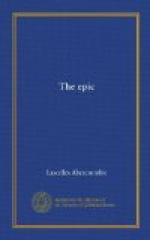Goethe is profoundly right; though possibly he puts it in a way to which Homer himself might have demurred. For the phrase inevitably has its point in the word “Hell”; Homer, we may suppose, would have preferred the point to come in the word “enact.” In any case, the details of Christian eschatology must not engage us much in interpreting Goethe’s epigram. There is truth in it, not simply because the two poems take place in a theatre of calamity; not simply, for instance, because of the beloved Hektor’s terrible agony of death, and the woes of Andromache and Priam. Such things are the partial, incidental expressions of the whole artistic purpose. Still less is it because of a strain of latent savagery in, at any rate, the Iliad; as when the sage and reverend Nestor urges that not one of the Greeks should go home until he has lain with the wife of a slaughtered Trojan, or as in the tremendous words of the oath: “Whoever first offend against this oath, may their brains be poured out on the ground like this wine, their own and their children’s, and may their wives be made subject to strangers.” All that is one of the accidental qualities of Homer. But the force of the word “enact” in Goethe’s epigram will certainly come home to us when we think of those famous speeches in which courage is unforgettably declared—such speeches as that of Sarpedon to Glaukos, or of Glaukos to Diomedes, or of Hektor at his parting with Andromache. What these speeches mean, however, in the whole artistic purpose of Homer, will assuredly be missed if they are detached for consideration; especially we shall miss the deep significance of the fact that in all of these speeches the substantial thought falls, as it were, into two clauses. Courage is in the one clause, a deliberate facing of death; but something equally important is in the other. Is it honour? The Homeric hero makes a great deal of honour; but it is honour paid to himself, living; what he wants above everything is to be admired—“always to be the best”; that is what true heroism is. But he is to go where he knows death will strike at him; and he does not make much of honour after death; for him, the meanest man living is better than a dead hero. Death ends everything, as far as he is concerned, honour and all; his courage looks for no reward hereafter. No; but since ten thousand fates of death are always instant round us; since the generations of men are of no more account than leaves of a tree; since Troy and all its people will soon be destroyed—he will stand in death’s way. Sarpedon emphasizes this with its converse: There would be no need of daring and fighting, he says, of “man-ennobling battle,” if we could be for ever ageless and deathless. That is the heroic age; any other would say, If only we could not be killed, how pleasant to run what might have been risks! For the hero, that would simply not be worth while. Does he find them pleasant, then, just because they are risky? Not quite; that, again, is to detach part of the meaning from the whole. If anywhere, we shall, perhaps, find the whole meaning of Homer most clearly indicated in such words as those given (without any enforcement) to Achilles and Thetis near the beginning of the Iliad, as if to sound the pitch of Homer’s poetry:




